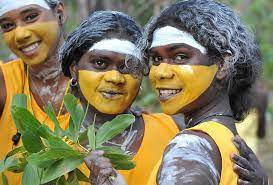Posted on May 31, 2022
This is an update of my post published on May 31, 2011:
Reconciliation
means coming together.
And, in the case of Australia's Reconciliation Week, it means working to overcome divisions and inequality between Aboriginal people and Torres Strait Islanders, on the one hand, and non-Indigenous (largely European-ancestry) Australians, on the other.
According to the official website, National Reconciliation Week (May 27 to June 3) is "a time for all Australians to learn about our shared histories, cultures, and achievements, and to explore how each of us can contribute to achieving reconciliation in Australia."
 |
Aboriginal Australians |
This year, the theme of Reconciliation Week is "Be Brave. Make Change." It's about helping to "collectively build relationships and communities that value Aboriginal and Torres Strait Islander peoples, histories, cultures, and futures."
Cooee!
Many Aboriginal words are familiar to English speakers because they have have actually been adopted into the English language. Some of the names for animals are among my favorite words in the world: dingos, kangaroos, potoroos, wombats, wallabies, koalas, and kookaburras.
Boomerangs are weapons (and toys), billabongs are small lakes or waterholes, and yabber means (as it sounds) “to talk.”
Strangely, the word didgeridoo is not an Aboriginal word, even though it names an Aboriginal musical instrument. There are a variety of Aboriginal words for the instrument, including yadaki. The word didgeridoo is of Western origin and could be onomatopoetic—in other words, copying the sound that the didgeridoo makes.
I also thought that bandicoots and emus, Australian animals, got their names from Aboriginal languages, but in actual fact bandicoot comes from Teluga (a language of India), and emu from Arabic. Of course, there are lots of Australian slang words that are not Aboriginal in origin!
Strangely, the word didgeridoo is not an Aboriginal word, even though it names an Aboriginal musical instrument. There are a variety of Aboriginal words for the instrument, including yadaki. The word didgeridoo is of Western origin and could be onomatopoetic—in other words, copying the sound that the didgeridoo makes.
I also thought that bandicoots and emus, Australian animals, got their names from Aboriginal languages, but in actual fact bandicoot comes from Teluga (a language of India), and emu from Arabic. Of course, there are lots of Australian slang words that are not Aboriginal in origin!
Learn about Aboriginal art and culture!
Check out last year's post.
Plan ahead:
Check out my Pinterest boards for:























No comments:
Post a Comment